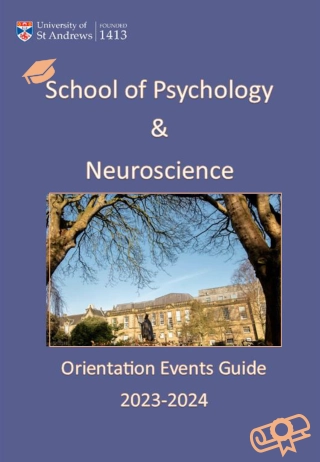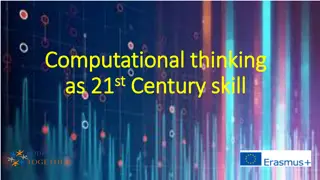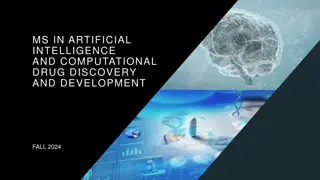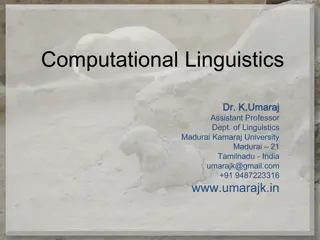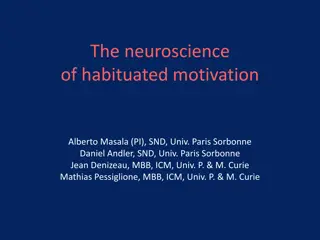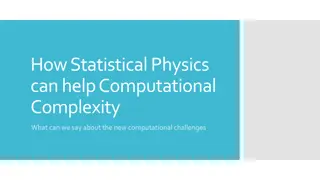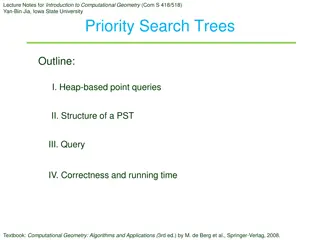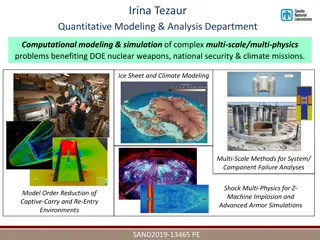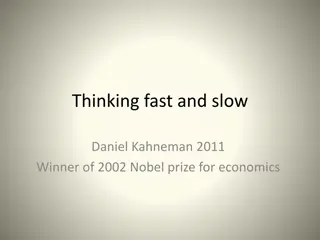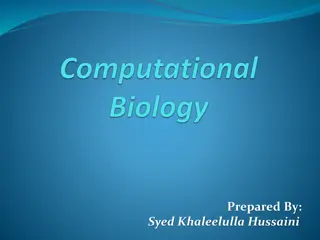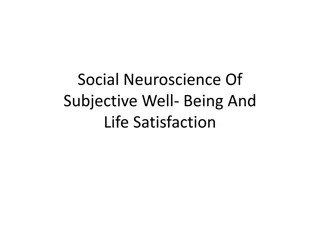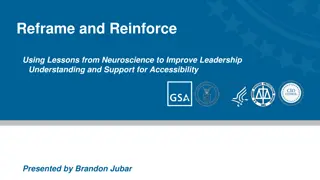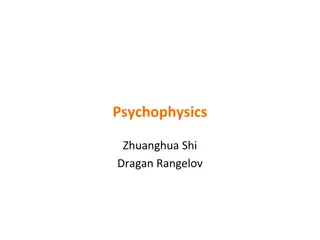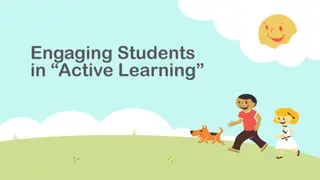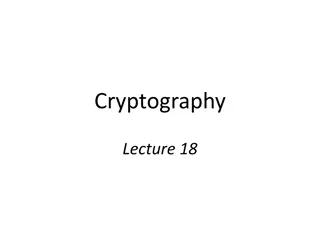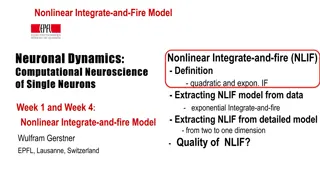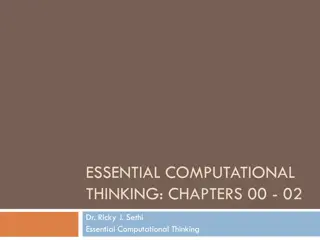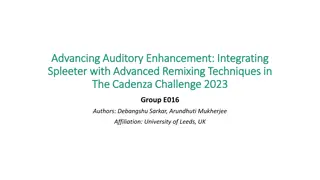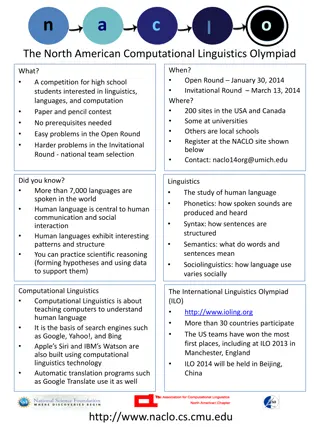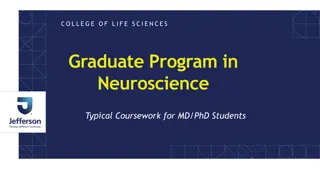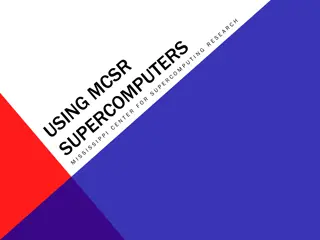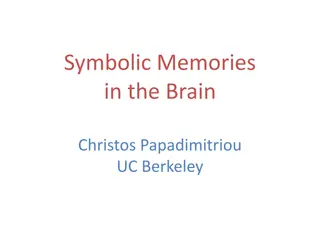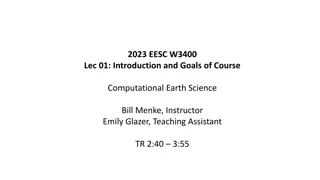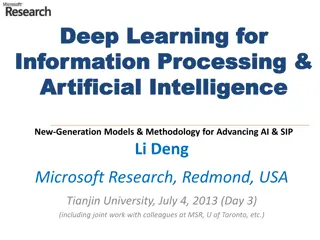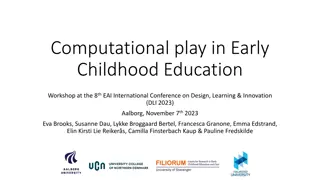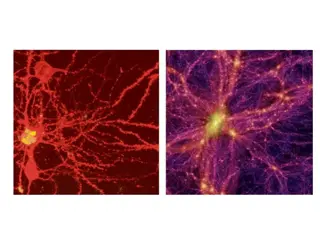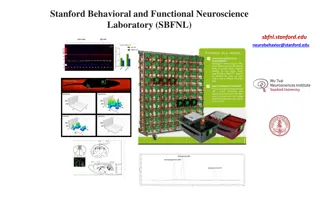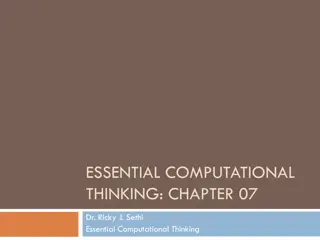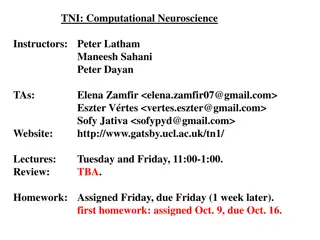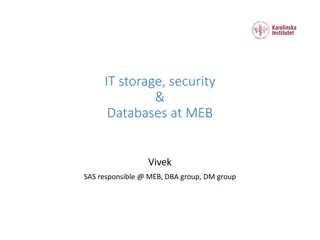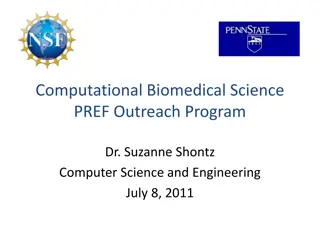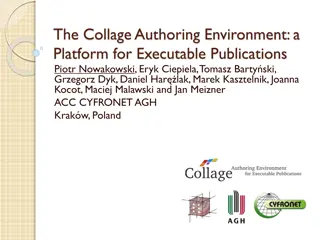School of Psychology & Neuroscience Orientation Events Guide 2023-2024
Delve into the exciting events lined up for the School of Psychology & Neuroscience's orientation week from September 4th to 8th, offering a mix of social gatherings, informational sessions, and subject-specific welcomes. Explore activities like meeting the School President, picnics, welcome parties
3 views • 19 slides
Computational thinking as 21st Century skill
Computational thinking is a critical skill for the digital age, involving problem-solving techniques that enable computers to process information effectively. It precedes programming and requires breaking down complex problems into manageable steps. Educators emphasize computational thinking exercis
7 views • 4 slides
Master's Program in Computational Drug Discovery and Development - Fall 2024 Curriculum
This Master's program offers a comprehensive curriculum focusing on Artificial Intelligence, Computational Drug Discovery, and Development. With a blend of cutting-edge technologies and practical applications, students delve into techniques, AI/ML, big data mining, modeling, and more. Through intens
1 views • 7 slides
Trauma and Healing: Insights from Neuroscience
Recent neuroscience findings based on the work of Professor Bessel van der Kolk shed light on how trauma affects the human organism. Traumatic experiences leave lasting legacies on individuals, families, and societies, impacting mental, emotional, and physical well-being. The profound changes trauma
1 views • 32 slides
Computational Linguistics and Natural Language Processing
Explore the fascinating fields of Computational Linguistics and Natural Language Processing (NLP), delving into their development, applications, and significance. Learn about the study of human languages in computational models, the importance of corpora in linguistic research, and the various types
3 views • 33 slides
The Neuroscience of Habituated Motivation in Virtue Cultivation
Exploring the intersection of Aristotelian theory, cognitive neuroscience, and moral philosophy, this research delves into the conditions and mechanisms underlying the cultivation of virtuous habits through apprenticeship. By leveraging diverse expertise in philosophy, neuroscience, and cognitive sc
3 views • 21 slides
Computational Complexity Through Statistical Physics
In the age of vast data growth, tackling complex computational problems is crucial. Statistical physics can provide insights into handling the new challenges arising from the exponential increase in data. As we delve into understanding the complexity of computational tasks, it becomes evident that e
0 views • 24 slides
Introduction to Priority Search Trees in Computational Geometry
This lecture outlines the structure and query process of Priority Search Trees (PST) in computational geometry. It covers heap-based point queries, range trees for windowing queries, handling query ranges in 1D and 2D spaces, and using heaps to efficiently handle query ranges. The content discusses
1 views • 18 slides
Advancing Computational Modeling for National Security and Climate Missions
Irina Tezaur leads the Quantitative Modeling & Analysis Department, focusing on computational modeling and simulation of complex multi-scale, multi-physics problems. Her work benefits DOE nuclear weapons, national security, and climate missions. By employing innovative techniques like model order re
0 views • 6 slides
Insights from "Thinking, Fast and Slow" and Neuroscience Advances
Explore the shift in understanding human rationality from the mid-20th century to the present through works like "Thinking, Fast and Slow" by Daniel Kahneman. Delve into the impact of strong emotions on decision-making, the role of unconscious thinking in decision processes as discussed in "Stranger
0 views • 63 slides
Computational Biology: Proteins, DNA, RNA, Genetics, and Evolution
Computational Biology combines computational methods with molecular biology to solve biological problems. Explore topics like proteins, DNA, RNA, and genetics, learning about amino acids, nucleotides, and the genetic code. Understand the evolutionary processes of mutation and natural selection.
0 views • 21 slides
Social Neuroscience: Exploring Human Sociality and Well-Being
Social neuroscience delves into how the brain processes social interactions and their impact on human well-being. It focuses on the interconnectedness between social connections and overall life satisfaction, suggesting that humans are inherently social beings with a strong need for social belonging
3 views • 21 slides
Neuroscience-Informed Leadership: Reframing for Accessibility
Explore how neuroscience insights can enhance leadership understanding and support for accessibility in organizations. Learn how leveraging metaphors and analogies from neuroscience can facilitate change management and foster a more inclusive work environment. Discover the key principles of the ADKA
0 views • 16 slides
Psychophysical Methods in Cognitive Neuroscience
This collection of images explores the field of psychophysics, focusing on perception, reality, behavior, and the analysis of cognitive functions. The images delve into the reasons for studying psychophysical methods, the complexity of neuro-cognitive phenomena, and the importance of behavioral meas
0 views • 21 slides
Statistical Models in Neuroscience Research
Dive into the world of statistical models in neuroscience research with a focus on model introduction, fitting, and comparison. Explore the significance of these models in describing and explaining complex phenomena using examples and common models prevalent in the field.
0 views • 32 slides
Enhancing Learning Through Neuroscience and Active Engagement
Explore the intersection of neuroscience and active learning to understand how neurons are activated when exposed to stimuli. Discover the importance of creating disequilibrium for new learning and how adults modify existing networks through experience. Dive into memory models and the role they play
0 views • 15 slides
Introduction to Computational Number Theory in Cryptography
Practical private-key cryptography can be done without advanced math, but understanding computational number theory is essential for public-key encryption. This field focuses on the computational difficulty of problems, analyzing algorithms' running times, classifying problems as easy or hard based
0 views • 27 slides
Nonlinear Integrate-and-Fire Models in Neuronal Dynamics
Exploring the Nonlinear Integrate-and-Fire (NLIF) model in computational neuroscience, including its definition, the quadratic and exponential IF variations, and methods for extracting NLIF models from data and detailed neuronal models. Gain insights into the complex dynamics of single neurons throu
0 views • 32 slides
The Essence of Computer Science and Computational Thinking
Delve into the fundamentals of Computer Science and Computational Thinking through chapters discussing the nature of science, predictions in physics, and the distinction between Computer Science and Computer Information Systems. Explore the relationships between Math, Physics, and Computer Science i
0 views • 29 slides
Advancing Auditory Enhancement: Integrating Spleeter with Advanced Remixing Techniques in The Cadenza Challenge 2023
Our project for The Cadenza Challenge 2023 focused on improving audio for headphone users with hearing loss by integrating Spleeter's deep learning capabilities. We utilized N-ALR prescriptions, Butterworth bandpass filters, and Dynamic Range Compression to enhance audio quality. By leveraging advan
0 views • 19 slides
North American Computational Linguistics Olympiad: A Competition for High School Students
The North American Computational Linguistics Olympiad (NACLO) is a competition for high school students interested in linguistics, languages, and computation. It consists of an Open Round in January and an Invitational Round in March, with no prerequisites needed. Participants tackle easy problems i
0 views • 4 slides
MD/PhD Program in Neuroscience Coursework Overview
Detailed overview of the coursework structure for MD/PhD students in the Neuroscience Graduate Program at the College of Life Sciences. The summary covers required courses for Year 1 Fall, Winter, Spring, and Summer, as well as Year 2 Fall and Winter, including research, seminars, journal clubs, and
0 views • 10 slides
Mississippi Center for Supercomputing Research (MCSR) Overview
The Mississippi Center for Supercomputing Research (MCSR) supports computational research in various fields like Chemistry, Bioinformatics, Physics, Engineering, and Computer Science for Mississippi IHLs. They provide training to optimize computational resources, offer classes for computational trai
0 views • 23 slides
Computational Theories of Brain Function
In this series of images and text snippets, the discussion revolves around the emerging field of computational theories of brain function. Various aspects such as symbolic memories, the relationship between the brain and computation, the emergence of the mind from the brain, and computational thinki
0 views • 53 slides
Computational Earth Science Course Overview
Explore the world of Computational Earth Science with Bill Menke as the instructor and Emily Glazer as the teaching assistant. The course aims to help you become proficient in applying Python-based computational methods to understand dynamic Earth Science phenomena. Through modeling, you will gain i
0 views • 34 slides
Microsoft Research: Deep Learning, AI, and Information Processing Overview
Dive into the world of deep learning and artificial intelligence through Microsoft Research's exploration of new-generation models and methodologies for advancing AI. Topics covered include computational neuroscience, deep neural networks, vision and speech recognition, as well as the application of
0 views • 19 slides
Computational Play in Early Childhood Education: DLI 2023 Workshop
The workshop at the 8th EAI International Conference on Design, Learning & Innovation (DLI 2023) in Aalborg aims to delve into the application of computational play with mathematics in early childhood education. Through live sessions and discussions, opportunities and challenges in utilizing computa
0 views • 7 slides
Cognitive Neuroscience of Memory and Language - Interactive Learning Experience
Delve into the realm of cognitive neuroscience through an engaging experience focused on memory and language. Explore concepts, play memory games, and develop key skills like problem-solving and creativity. Discover the mysteries of the human brain while embracing the idea that answers are yet to be
0 views • 10 slides
Biomedical Engineering
The Department of Biomedical Engineering at Indian Institute of Technology Hyderabad (IITH) is welcoming applications from highly motivated students interested in research areas such as Biomedical Imaging, Biomicrofluidics & Biomechanics, Regenerative Medicine & Stem Cell Research, Nano Medicine & R
0 views • 16 slides
Stanford Behavioral and Functional Neuroscience Laboratory (SBFNL)
Conduct cutting-edge research in behavioral and functional neuroscience at Stanford. Explore new equipment, disease models, and advanced monitoring systems for animal studies. Specialized chambers for self-administration studies and microdialysis with sensitive HPLC-MS detection systems.
0 views • 21 slides
ESSENTIAL COMPUTATIONAL
In Chapter 7 of "Essential Computational Thinking" by Dr. Ricky J. Sethi, dive into procedural programming concepts like sequence, selection, and iteration to craft computational solutions. Explore how engineers approach problem-solving in software development, emphasizing efficiency and abstraction
0 views • 27 slides
Computational Neuroscience Basics
Delve into the world of computational neuroscience through a course featuring key brain facts, essential math concepts, and a deep dive into the complex structures within your cortex. Explore the intricate network of neurons, connections, and axons that make up just a tiny fraction of this incredibl
0 views • 99 slides
Neuroscience at UCL: Computational Brain Insights
Delve into the world of computational neuroscience with instructors Peter Latham, Maneesh Sahani, and Peter Dayan at University College London. Explore the brain's intricacies, from basic facts to mathematical foundations, and uncover the hidden complexities of neural processes. Engage in lectures,
0 views • 98 slides
IT storage, security & Databases at MEB
Responsible for managing data storage, security, and databases at MEB Vivek SAS. The role involves overseeing various server setups, computational servers, home and scratch disk management, and providing access to applications and SQL servers. Additionally, managing computational servers at MEB requ
0 views • 13 slides
Computational Biomedical Science Outreach Program - Overview
Delve into the intersection of computational science and biomedical engineering through the Computational Biomedical Science Outreach Program led by Dr. Suzanne Shontz. Explore the application of computational tools in treating conditions like deep vein thrombosis and hydrocephalus. Learn about the
0 views • 29 slides
Platform for Executable Publications in Modern Computational Science
Computational science faces challenges in publishing large data volumes and complex algorithms. The Collage Authoring Environment offers a solution for validating and sharing executable content within research papers, addressing issues of trust and verifiability in scientific publications. This plat
0 views • 19 slides
Computational Models for Tuberculosis Diagnosis: A Review
This systematic review examines computational models for diagnosing tuberculosis, highlighting strengths, weaknesses, and areas for improvement. The research aims to enhance TB diagnostic accuracy through advanced computational systems.
0 views • 19 slides
How theory, modeling, and experiment cooperate to build a framework for synaptic plasticity
Synaptic plasticity, a fundamental process in neuroscience, is explored through a combination of theory, modeling, and experimentation. Insights from pioneers like William James and Donald Hebb, along with modern research on BCM theory and STDP, shed light on the mechanisms underlying neural connect
0 views • 23 slides
Computational geometry introduction
Dive into the fundamentals of computational geometry with this introduction by Rugaia Omer Ahmed. Explore key concepts, algorithms, and applications in the field. Gain insights into geometric computations and problem-solving techniques. Enhance your understanding of spatial data structures and geome
0 views • 15 slides
Mastering Computational Geometry: Problem-Solving Strategies
Explore the world of computational geometry through practical problems like finding the closest pair of points in a 2D plane. Delve into the divide and conquer approach to efficiently solve complex geometric challenges. Uncover insights on organizing points, sorting by x-values, and handling proximi
0 views • 25 slides
